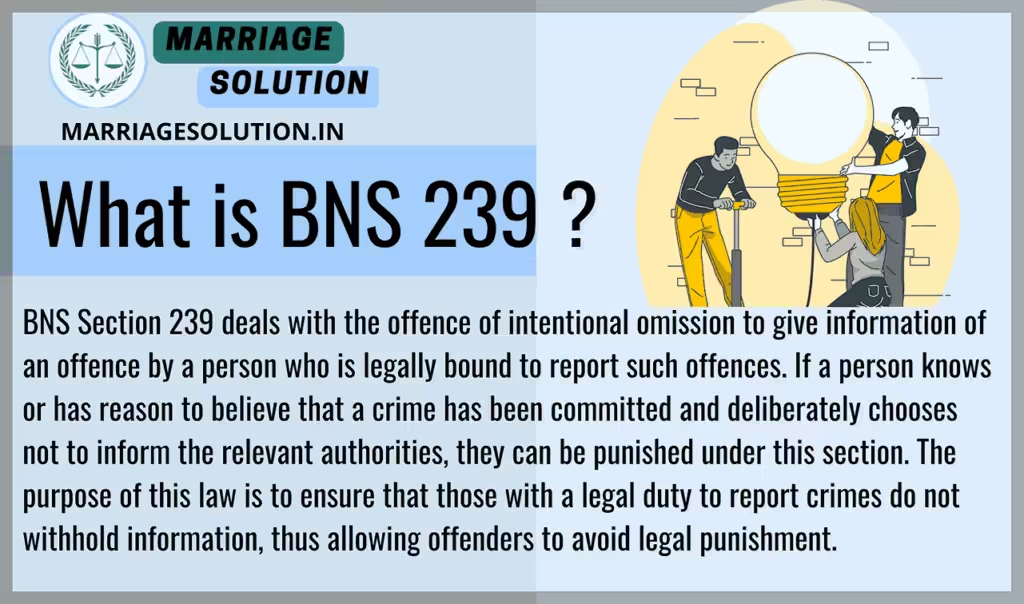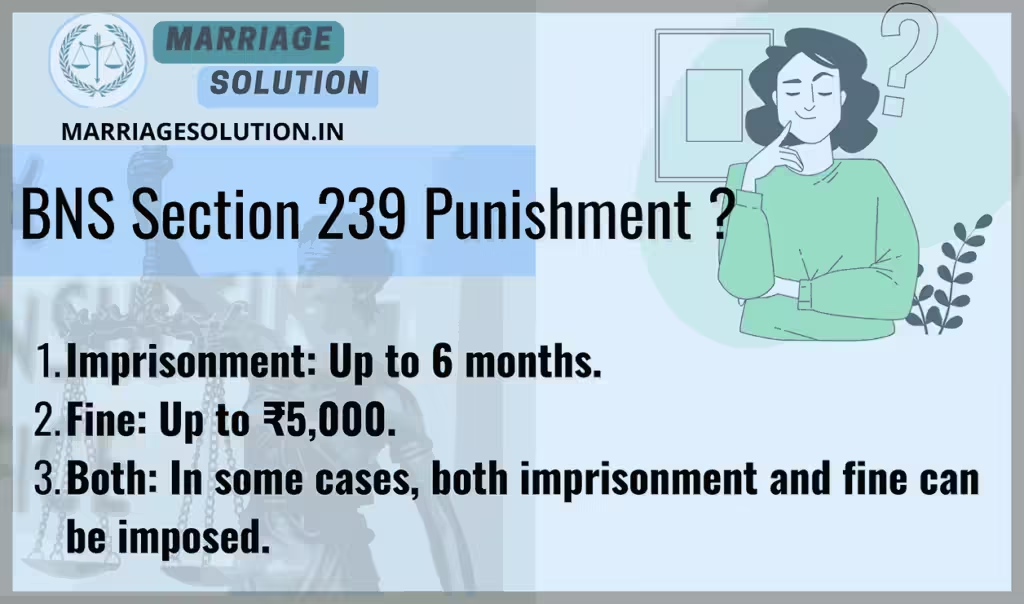Introduction of 239 BNS
Bharatiya Nyaya Sanhita (BNS) Section 239 deals with the offence of intentionally not reporting a crime by a person who is legally bound to do so. If someone knows or has strong reason to believe that an offence has been committed, and deliberately chooses not to inform the authorities, they are punishable under this law.
The aim of Section 239 is to ensure that people in responsible positions—such as police officers, government officials, or professionals with legal duties—cannot ignore crimes. By enforcing accountability, the law helps prevent offenders from escaping justice.
The Bharatiya Nyaya Sanhita (BNS) Section 239 replaces the old Indian Penal Code (IPC) Section 202.
What is BNS Section 239 ?
BNS Section 239 deals with the offence of intentional omission to give information of an offence by a person who is legally bound to report such offences. If a person knows or has reason to believe that a crime has been committed and deliberately chooses not to inform the relevant authorities, they can be punished under this section. The purpose of this law is to ensure that those with a legal duty to report crimes do not withhold information, thus allowing offenders to avoid legal punishment.

Under Section 239 of the bns act 2023
“Whoever, being legally bound to give information of an offence, intentionally omits to do so, shall be punished with imprisonment for a term which may extend to six months, or with fine which may extend to five thousand rupees, or with both.”
1. Meaning of “Intentional Omission to Give Information”
- This section applies when a person knows or has reason to believe that an offence has been committed.
- The person is legally bound (by law, duty, or professional responsibility) to inform authorities about the offence.
- If the person deliberately chooses not to report the offence, it becomes a punishable omission.
- Accidental failure or ignorance does not amount to liability — the omission must be intentional.
2. Who is Covered?
This section applies to:
- Public servants such as police officers or government officials who must report crimes.
- Professionals (e.g., doctors, social workers) in cases where the law imposes a reporting duty.
- Individuals in specific situations where law requires reporting (like witnesses or responsible citizens bound under certain statutes).
3. Nature of the Offence
- Non-Cognizable → Police cannot arrest without a warrant.
- Bailable → The accused has the right to bail.
- Non-Compoundable → Cannot be privately settled; must be tried in court.
- Triable by Magistrate → Any Magistrate may hear the case.
4. Examples of BNS Section 239
- Example 1 – Police Officer Ignoring Theft
A police officer knows that a theft took place in his area but does not report it to higher authorities. Since he was legally bound, his omission makes him liable under Section 239. - Example 2 – Doctor Withholding Information
A doctor learns of a domestic violence case through a patient but deliberately avoids informing the authorities, despite being legally bound. → Punishable under this section. - Example 3 – No Liability Case
A person does not report a crime because he genuinely did not know about it or believed no offence occurred. Since the omission was not intentional, he is not guilty.
5. Punishment under BNS Section 239
- Imprisonment → Up to 6 months.
- Fine → Up to ₹5,000.
- Both → In some cases, both imprisonment and fine may be imposed.
6. Importance of BNS Section 239
- Ensures accountability among persons with a legal duty to report crimes.
- Prevents offenders from escaping justice due to silence.
- Promotes transparency and responsibility in society.
- Strengthens rule of law by making omissions punishable when they obstruct justice.
Section 239 BNS Overview
BNS Section 239 ensures that individuals who are legally obligated to report crimes do so. Failing to report a crime can allow offenders to escape justice, and this section holds those who deliberately omit to provide information accountable. The law encourages transparency and ensures that legal responsibilities are fulfilled, with appropriate punishment for those who fail to comply.
Key Points of BNS Section 239
- Intentional Omission to Report a Crime: BNS Section 239 applies when a person, knowing that an offence has occurred, deliberately chooses not to report it. This omission must be intentional and not due to an accident or ignorance.
- Legal Obligation to Inform: Only individuals who have a legal obligation to inform authorities about a crime are covered under this section. This can include police officers, certain government officials, or others who are required by law to report specific crimes.
- Knowledge of the Offence: The individual must have knowledge or a strong reason to believe that a crime has been committed. Simply suspecting without concrete evidence may not be enough for prosecution under this section.
- Punishment: If found guilty of intentional omission, the punishment can be imprisonment for up to six months, or a fine of up to ₹5,000, or both. The sentence depends on the severity of the omission and the legal context of the case.
- Non-Cognizable Offence: Since BNS Section 2239 is classified as a non-cognizable offence, the police cannot arrest the accused without a warrant. This also means that the investigation can only be initiated with the permission of a magistrate.
- Bailable Offence: The offence is bailable, meaning that the accused can apply for bail and be released from custody while the trial is ongoing. Bail can be granted as per the discretion of the magistrate or court.
- Non-Compoundable: This offence is non-compoundable, which means that the parties involved cannot settle the matter out of court. Once the offence is reported and the case is initiated, it must proceed through the judicial system.
- Trial by Magistrate: The trial for an offence under BNS Section 239 is conducted by any magistrate, and the case is heard in a magistrate’s court.
- Intent and Circumstances Matter: The intention behind the omission is crucial. If the omission was accidental or the person did not have concrete information about the offence, they may not be held liable. The prosecution must prove that the omission was deliberate.
- Public Duty Emphasis: This section emphasizes the duty of certain individuals to act in the public interest by reporting crimes. Failing to do so can result in allowing offenders to escape justice, which this section seeks to prevent.
Example Scenarios:
- Example 1: A is a police officer. He knows that a theft has occurred in his jurisdiction, but he decides not to report it to his superiors or take any action. Since he is legally bound to report any offence, his intentional omission to inform would make him liable under BNS Section 239.
- Example 2: B, a doctor, is aware that a case of domestic violence occurred in one of his patients’ homes. Although he is legally required to report such incidents, he chooses to remain silent and does not inform the authorities. This deliberate omission would make him punishable under this section.
BNS 239 Punishment
- Imprisonment: Up to 6 months.
- Fine: Up to ₹5,000.
- Both: In some cases, both imprisonment and fine can be imposed.

BNS 239 bailable or not ?
Yes, offences under BNS Section 239 are bailable. This means the accused person has the right to apply for bail and can be released from custody while awaiting trial.
Comparison table — BNS 239 vs IPC 202
| Section | What it Means | Punishment | Bailable? | Cognizable? | Trial By |
|---|---|---|---|---|---|
| BNS Section 239 | Applies when a person intentionally fails to give information about an offence that they are legally bound to report. This section ensures accountability among those with a legal duty to inform authorities. | Imprisonment up to 6 months or fine up to ₹5,000 or both. | Bailable | Non-cognizable | Any Magistrate |
| IPC Section 202 (Old) | Punished anyone who, being legally bound to inform authorities of an offence, intentionally omits to do so. It applied to public servants or persons with legal obligations to report crimes. | Imprisonment up to 6 months or fine up to ₹5,000 or both (same as BNS 239). | Bailable | Non-cognizable | Magistrate |
| Key Difference: BNS Section 239 replaces IPC Section 202 with updated language under the new Bharatiya Nyaya Sanhita, 2023. While the core idea remains the same—punishing intentional failure to report an offence—BNS 239 emphasizes legal duty, accountability, and modern statutory alignment under the reformed criminal law system. | |||||
BNS Section 239 FAQs
What is BNS Section 239 about?
BNS Section 239 deals with the offence of intentionally failing to report a crime by a person who is legally bound to provide such information. If someone deliberately omits to report a crime they know about, they can be punished under this section.
Who is legally bound to report a crime under BNS Section 239?
Individuals such as police officers, government officials, and other specific persons who have a legal duty to report certain offences are bound by this section. It applies to anyone who has a legal obligation to provide information about a crime.
What is the punishment for violating BNS Section 239?
If convicted under BNS Section 239, the punishment can be imprisonment for up to six months, a fine of up to ₹5,000, or both. The penalty depends on the nature of the omission and the seriousness of the crime.
Is the offence under BNS Section 239 bailable?
Yes, the offence under BNS Section 239 is bailable. This means that the accused can apply for bail and be released while awaiting trial.
Is BNS Section 239 a cognizable offence?
No, BNS Section 239 is classified as a non-cognizable offence. The police cannot arrest the accused without a warrant, and the investigation requires permission from a magistrate.
Can the offence under BNS Section 239 be settled outside court?
offence is non-compoundable, meaning that the parties involved cannot settle the matter out of court. The case must proceed through the judicial process once it is filed.
Conclusion
BNS Section 239 reinforces the principle that duty matters: when the law places an obligation to report crimes, failing to do so deliberately is punishable. By holding responsible persons accountable for intentional silence, the provision helps close loopholes that allow offenders to go free and strengthens public confidence in law enforcement and governance. For professionals and officials who have reporting duties, the message is clear — reporting is a legal obligation, not a mere formality.
Need Legal Support?
If you are dealing with court cases, marriage problems, or any other legal issue, our team at Marriage Solution – Lawyer Help is here for you. Simply fill out our quick online enquiry form, and we’ll connect you with the right legal expert to support your needs.
Finished with BNS 239 ? Continue exploring the next provisions of the Bharatiya Nyaya Sanhita (BNS), 2023. Each section includes explanations, examples, and plain-language breakdowns for easy understanding.
- BNS 240 : Giving false information respecting an offence committed.
- https://marriagesolution.in/bns_section/bns-240/
- 241 BNS : Destroying a document or electronic record so that it cannot be used as evidence in a case.
- https://marriagesolution.in/bns_section/241-bns/
- 242 BNS : False personation for purpose of act or proceeding in suit or prosecution.
- https://marriagesolution.in/bns_section/242-bns/
- 243 BNS : Fraudulent removal or concealment of property to prevent its seizure as forfeited or in execution.
- https://marriagesolution.in/bns_section/243-bns/
- BNS 244 : Fraudulent claim to property to prevent its seizure as forfeited or in execution.
- https://marriagesolution.in/bns_section/bns-244/
Full IPC Section List: https://marriagesolution.in/ipc-section-list
All Indian Law & Blogs: https://marriagesolution.in/indian-law/
Full BNSS Section List: https://marriagesolution.in/bnss_section-list
